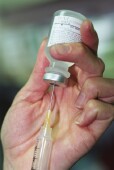- Could Your Grocery Store Meat Be Causing Recurring UTIs?
- Are You Making This Expensive Thermostat Error This Winter?
- Recognizing the Signs of Hypothyroidism
- 10 Strategies to Overcome Insomnia
- Could Artificial Sweeteners Be Aging the Brain Faster?
- Techniques for Soothing Your Nervous System
- Does the Water in Your House Smell Funny? Here’s Why
- Can a Daily Dose of Apple Cider Vinegar Actually Aid Weight Loss?
- 6 Health Beverages That Can Actually Spike Your Blood Sugar
- Treatment Options for Social Anxiety Disorder
Shingles Vaccine Still Effective After Chemotherapy


The shingles vaccine remains effective in older people after they’ve had chemotherapy, a new study finds.
“The zoster vaccine has been shown to be safe and effective in elderly adults with healthy immune systems but until now, there has been a lack of data on whether the vaccine remains safe and effective for individuals who might have compromised immune systems resulting from treatments like chemotherapy,” study author Hung Fu Tseng, of the Kaiser Permanente Southern California Department of Research and Evaluation, said in a Kaiser news release.
“Our study demonstrates that older patients who had previously been vaccinated against shingles have a lower chance of developing this painful and often debilitating disease after chemotherapy,” Tseng said.
Researchers analyzed the medical records of more than 21,000 people aged 60 and older who had chemotherapy between January 2007 and December 2012. Those who had previously received the shingles (herpes zoster) vaccine were 42 percent less likely to develop shingles after chemotherapy, compared with those who had never been vaccinated.
No vaccinated patients were hospitalized for shingles, compared with six unvaccinated patients, according to the study published online on Aug. 4 in the journal Clinical Infectious Diseases.
Shingles — which can affect anyone who has had chickenpox — causes a painful rash and blisters that develop on one side of the face or body. Other symptoms include fever, chills and headache.
Before the shingles vaccine was available, nearly one-third of Americans developed shingles at some point in their lives, according to the U.S. Centers for Disease Control and Prevention. The CDC recommends that people aged 60 and older get the shingles vaccine.
“Age is associated with increased risk of cancers and other medical conditions that may require immunocompromising treatments such as chemotherapy,” Tseng said. “It is important that elderly patients get vaccinated when they are relatively healthy, or before starting immuno-compromising treatments, because the vaccine isn’t advised for those who have weakened immune systems.”
More information
The U.S. National Library of Medicine has more about shingles.
Source: HealthDay
Copyright © 2026 HealthDay. All rights reserved.










